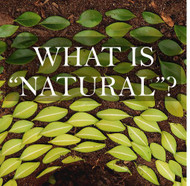What is "Natural"?
Posted by Celtic Sustainables on 31st Oct 2018

Along with “being made from natural ingredients”, the term “Natural” is often used by our customers as shorthand for “healthy”, “wholesome”, “non-toxic”, “benign when disposed of” , “better for you”, “organic” and a whole raft of other meanings. Granted, some of the alternative term examples given here are nonsensical. After all we all know some “natural” things are toxic or can cause allergic reactions in some people. However “natural” is a term that we often discuss with customers to find out exactly what properties they are looking for in the paint, decoration or building product they need.
Some of our suppliers use the word “natural” when describing their products. For example Osmo uses “carefully harvested natural oils …. natural ores” … "for it's finishes”. Ref: Osmo Environmental Policy. Savolit describe their Wood Wool Boards as “natural building boards” using “100% natural products”. Ref: Savolit.
Auro, whose tag line is “my world …. Naturally”, use the term prolifically when describing their ranges and have produced this document "Modification and consistency" - What is a natural paint?". This document is a fascinating read about the rise of the petrochemical (non-renewable) raw materials and their hope of the industry to return to natural raw materials. However they say, for products to perform within modern society (to be durable, high-strength, light-weight etc) it is sometimes necessary to “gently modify its chemical basic structure in a way that guarantees the required attributes”. Does this “gentle modification” of some of the ingredients still mean that the end products are “natural”?
Does the quantity of modified natural materials within the product and the extent to which they have been refined impact on whether a product is “natural” and if yes at what point? It could be for these reasons that suppliers like Earthborn steer away from “natural” and prefer to use the word “eco” instead. Ref: Earthborn FAQs. However the word “Eco” has many meanings and possibilities too – What is "Eco"?
Understanding Ingredients
The food industry is required by law to state the ingredients and to declare whether the food product contains any of the 14 food allergens defined by the EU (how comprehensive the ingredients listed in food stuffs are is another question raised by this article in The Guardian which talks about how chemicals that are "processing aids" are not "ingredients" and do not therefore need to be listed). Does the decorating and renovation industry need to start doing the same?
Celtic Sustainables strives to make available the ingredients list, technical and safety datasheets and all other relevant information so that individuals can make informed decisions about what to buy in relation to their own requirements. If you cannot find the information you need about any of the products we sell, please contact us.


